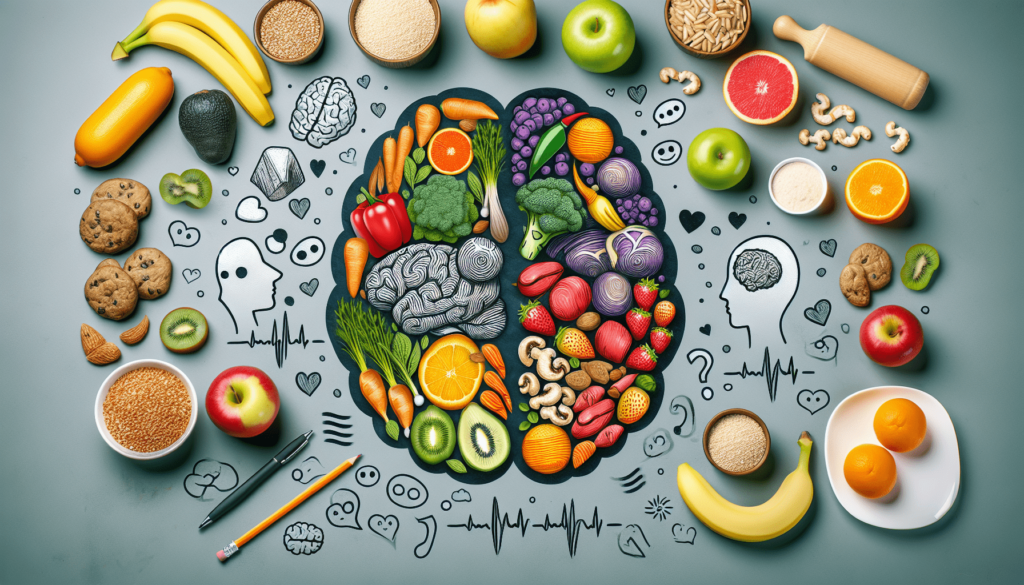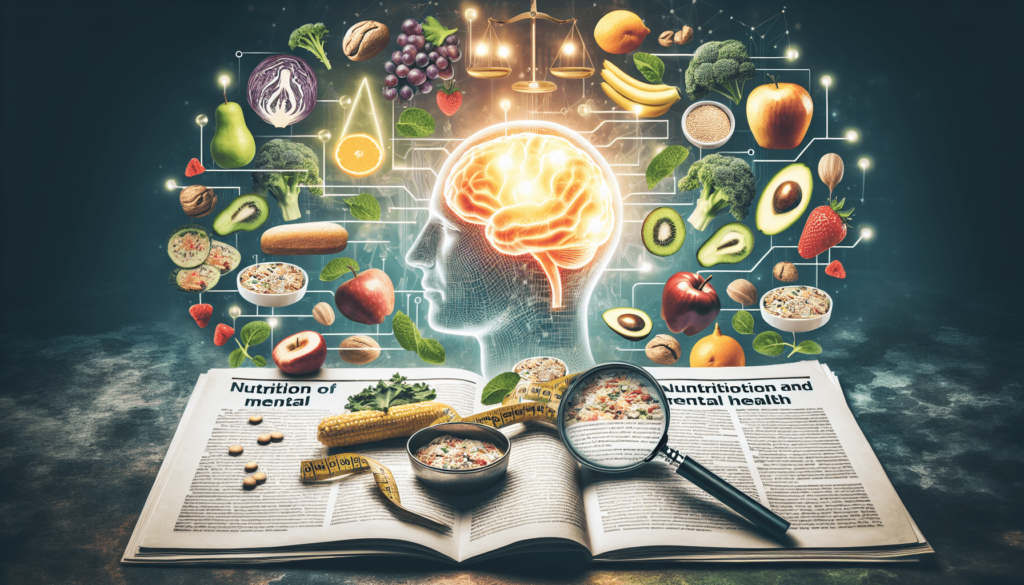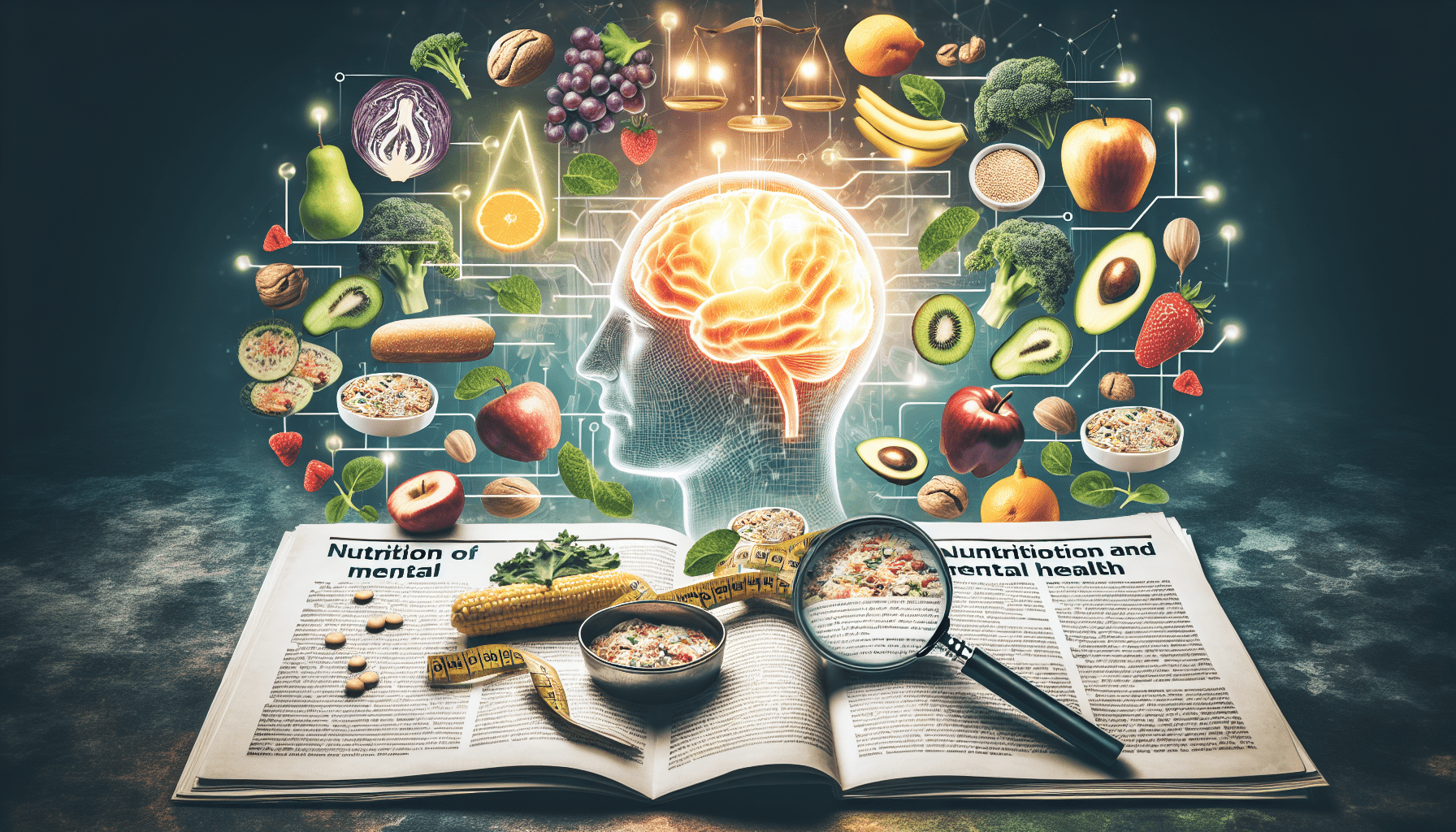Understanding The Link Between Nutrition And Mental Well-being
Have you ever considered the impact of your diet on your mental well-being? It turns out that what you eat not only affects your physical health but also has a significant influence on your mental state. In this article, we will explore the fascinating connection between nutrition and mental well-being, shedding light on how the food we consume can either uplift or hinder our overall mood and emotional stability. So, grab a cup of tea and get ready to discover the secrets of nourishing both your body and mind!

1. The Impact of Nutrition on Mental Health
Good nutrition is essential for overall health and well-being, and this extends to our mental health as well. The food we eat plays a significant role in brain function and can have a direct impact on our mood, cognition, and overall mental well-being. In this article, we will explore the various ways in which nutrition influences mental health and how different nutrients, diets, and lifestyle choices can affect our mental well-being.
1.1 The role of nutrients in brain function
Our brain is a complex organ that requires a constant supply of nutrients to function optimally. Nutrients such as omega-3 fatty acids, B vitamins, magnesium, and antioxidants play crucial roles in supporting cognitive function, neurotransmitter production, and reducing inflammation in the brain. Without an adequate intake of these essential nutrients, our brain may struggle to perform its functions effectively, leading to cognitive decline, mood disturbances, and other mental health issues.
1.2 The connection between gut health and mental health
Emerging research has highlighted the strong connection between our gut health and mental health. The gut-brain axis, a bidirectional communication system between the brain and the gut, plays a crucial role in regulating mood, emotions, and even cognitive processes. A healthy gut microbiome, which is made up of trillions of beneficial bacteria, is essential for maintaining mental well-being. Imbalances in the gut microbiome, such as a lack of diversity or an overgrowth of harmful bacteria, have been linked to conditions like depression, anxiety, and even neurodevelopmental disorders.
1.3 How different diets affect mental well-being
The types of food we consume are not only important for our physical health but also have a profound impact on our mental well-being. Different diets, such as the Mediterranean diet, the ketogenic diet, or a plant-based diet, have been studied for their effects on mental health. For example, the Mediterranean diet, which is rich in fruits, vegetables, whole grains, healthy fats, and lean proteins, has shown promising results in reducing the risk of depression and improving overall mental well-being. On the other hand, diets high in processed foods, sugar, and unhealthy fats have been linked to an increased risk of mental health disorders.
2. Essential Nutrients for Mental Well-being
2.1 Omega-3 fatty acids and their effect on mood
Omega-3 fatty acids, particularly docosahexaenoic acid (DHA) and eicosapentaenoic acid (EPA), are crucial for brain health and function. These essential fatty acids are found in fish, nuts, and seeds. Research has shown that omega-3 fatty acids have a positive impact on mood regulation, reducing symptoms of depression and anxiety. They also play a role in brain development and maintaining healthy brain cell membranes. Incorporating sources of omega-3 fatty acids into your diet, either through food or supplementation, can be beneficial for supporting mental well-being.
2.2 The importance of vitamins and minerals
Vitamins and minerals play diverse roles in maintaining optimal mental health. B vitamins, such as folate, B6, and B12, are essential for neurotransmitter synthesis and proper brain function. Deficiencies in these vitamins have been associated with an increased risk of depression and cognitive decline. Similarly, minerals like magnesium and zinc are involved in neurotransmitter production and have been linked to mood disorders when deficient. Including a variety of fruits, vegetables, whole grains, and lean proteins in your diet can help ensure you’re getting an adequate intake of these important vitamins and minerals for mental well-being.
2.3 Protein and its role in brain health
Protein is a macronutrient that plays a vital role in brain health. It provides the building blocks for neurotransmitters and brain tissue. Amino acids, the building blocks of protein, are essential for synthesizing neurotransmitters like serotonin and dopamine, which regulate mood and emotions. Including adequate protein sources, such as lean meats, fish, eggs, legumes, and tofu, in your diet can help support optimal brain function and mental well-being.
3. The Relationship Between Sugar and Mental Health
3.1 The effects of excessive sugar consumption on mood
Excessive consumption of sugar, especially added sugars found in processed foods and sugary beverages, can have detrimental effects on mental health. While sugar may temporarily boost mood and energy levels, it can lead to crashes and mood swings shortly after. High sugar intake has been associated with an increased risk of depression, anxiety, and poor cognitive function. It’s important to be mindful of sugar consumption and choose healthier alternatives like fresh fruits, natural sweeteners, and whole foods to support stable moods and mental well-being.
3.2 The role of sugar in inflammation and mental disorders
Chronic inflammation in the body has been linked to the development and progression of mental disorders, including depression and anxiety. Excessive sugar consumption can contribute to inflammation in the body, leading to increased risk of mental health issues. High sugar diets have also been associated with insulin resistance, which can interfere with proper brain function and mood regulation. By reducing sugar intake and focusing on a balanced diet with whole, unprocessed foods, you can help mitigate inflammation and support mental well-being.
3.3 Strategies for reducing sugar intake
Reducing sugar intake doesn’t mean eliminating all sweet treats from your diet. There are several strategies you can use to gradually reduce your sugar consumption and support mental health. Start by becoming aware of hidden sugars in processed foods by reading labels and choosing whole, unprocessed alternatives. Replace sugary drinks with water, herbal teas, or naturally flavored water. Experiment with healthier sweeteners like stevia, monk fruit, or small amounts of raw honey. Over time, your taste buds will adjust, and you’ll find satisfaction in the natural sweetness of whole foods, ultimately supporting your mental well-being.
4. Gut Health and Mental Well-being
4.1 The gut-brain axis and its influence on mood
The gut and the brain are intricately connected through the gut-brain axis, a complex communication system that allows constant interaction between the two. The gut microbiota, the collection of microorganisms residing in our intestines, plays a significant role in this communication. The gut microbiota produces neurotransmitters, such as serotonin, dopamine, and gamma-aminobutyric acid (GABA), which are crucial for regulating mood and emotions. Disruptions in the gut microbiota composition have been associated with an increased risk of mental health disorders. Maintaining a healthy gut by consuming probiotics and prebiotics can help support mental well-being.
4.2 The importance of probiotics and prebiotics
Probiotics are beneficial bacteria that can help restore and maintain a healthy balance in the gut microbiota. Consuming foods such as yogurt, kefir, sauerkraut, and kimchi, which are rich in probiotics, can support gut health and indirectly impact mental well-being. Prebiotics, on the other hand, are non-digestible fibers that serve as food for probiotics, helping them thrive and multiply. Sources of prebiotics include fruits, vegetables, whole grains, and legumes. Including both probiotics and prebiotics in your diet can promote a healthy gut microbiome, enhancing mental health.
4.3 How to improve gut health for better mental well-being
Improving gut health involves adopting healthy lifestyle habits and making dietary changes that support a diverse and thriving gut microbiota. Incorporate more fiber-rich foods into your diet, such as fruits, vegetables, whole grains, and legumes, as these provide nourishment for the beneficial bacteria in your gut. Reduce your intake of processed and sugary foods, as these can disrupt the balance of gut microbiota. Additionally, manage stress levels through mindfulness practices, exercise, and adequate sleep, as stress can negatively affect gut health. By prioritizing gut health, you can positively impact your mental well-being.

5. The Mediterranean Diet and Mental Health
5.1 Overview of the Mediterranean diet
The Mediterranean diet is a traditional eating pattern inspired by the dietary habits of people living in countries bordering the Mediterranean Sea. It is characterized by an abundance of fruits, vegetables, whole grains, legumes, nuts, seeds, olive oil, fish, and moderate consumption of dairy products, poultry, and eggs. Red meat and processed foods are limited in this diet. The Mediterranean diet is not only recognized for its potential benefits in reducing the risk of cardiovascular diseases but also has a positive impact on mental health.
5.2 Research on the positive effects of the Mediterranean diet on mental health
Numerous studies have shown a strong association between the Mediterranean diet and improved mental well-being. This dietary pattern has been linked to a reduced risk of depression, anxiety, and cognitive decline. The rich variety of nutrients, antioxidants, and polyphenols found in the Mediterranean diet provide protection against oxidative stress, inflammation, and neurodegeneration in the brain, contributing to better mental health outcomes. Additionally, the inclusion of omega-3 fatty acids, found in fish and olive oil, supports mood regulation and cognitive function.
5.3 Implementing the Mediterranean diet for improved well-being
To incorporate the Mediterranean diet into your lifestyle, focus on consuming whole, minimally processed foods. Fill your plate with a variety of colorful fruits and vegetables, whole grains like quinoa and brown rice, legumes such as chickpeas and lentils, and include healthy fats like olive oil, avocados, and nuts. Incorporate fish, such as salmon or sardines, into your meals a few times per week. Limit your intake of red meat and processed foods. Embrace the enjoyment of meals, prioritize social interactions around food, and savor the flavors of the Mediterranean diet for improved mental well-being.
6. The Role of Nutritional Deficiencies in Mental Disorders
6.1 Common nutrient deficiencies and their impact on mental health
Nutritional deficiencies can have a significant impact on mental health and contribute to the development or worsening of mental disorders. Some common nutrient deficiencies associated with mental health issues include omega-3 fatty acids, B vitamins (particularly folate and B12), iron, magnesium, zinc, and vitamin D. These deficiencies can disrupt neurotransmitter production, compromise brain function, and contribute to symptoms of depression, anxiety, and cognitive decline. Identifying and addressing these deficiencies through proper nutrition and, if necessary, supplementation can play a crucial role in supporting mental well-being.
6.2 Addressing nutritional deficiencies through diet and supplementation
The first step in addressing nutritional deficiencies is to identify the specific nutrient(s) that may be lacking. This can be done through blood tests and consultation with a healthcare professional. Once deficiencies are identified, dietary changes can be made to address the gaps. For example, increasing consumption of foods rich in the deficient nutrient(s) or considering supplementation under the guidance of a healthcare professional. However, it’s important to remember that a balanced diet should be the first line of defense against nutritional deficiencies, and supplementation should only be used when necessary and under professional guidance.
6.3 Collaborative treatment approaches combining nutrition and mental health care
A collaborative approach between nutrition professionals and mental health care providers can be highly beneficial for individuals seeking support for their mental well-being. Nutrition professionals can help identify potential nutrient deficiencies, develop personalized dietary plans, and provide education on the impact of nutrition on mental health. Mental health care providers, on the other hand, can address the psychological aspects of mental health and provide appropriate therapies. By combining these approaches, individuals can receive comprehensive care that integrates both nutrition and mental health support, leading to better overall well-being.
7. The Influence of Processed Foods on Mental Health
7.1 Effect of processed foods on mood and overall well-being
Processed foods, which are typically high in unhealthy fats, refined sugars, and artificial additives, can have a negative impact on mental health. Studies have shown that diets high in processed foods are associated with an increased risk of depression, anxiety, and other mental health disorders. These foods can lead to imbalances in blood sugar levels, cause inflammation in the body, and disrupt the delicate balance of neurotransmitters in the brain. Avoiding or minimizing processed food consumption can positively contribute to mood regulation and overall mental well-being.
7.2 The role of additives and preservatives in mental health symptoms
Certain additives and preservatives commonly found in processed foods have been linked to adverse effects on mental health. For example, artificial food colorings and flavorings, as well as monosodium glutamate (MSG), have been associated with increased hyperactivity in children and may exacerbate symptoms of attention deficit hyperactivity disorder (ADHD). Additionally, some individuals may be sensitive to preservatives like sulfites and nitrates, which can trigger migraines, mood swings, and other mental health symptoms. Opting for whole, unprocessed foods and reading labels to avoid these additives can support better mental health.
7.3 Tips for reducing processed food consumption
Reducing processed food consumption can be challenging, but implementing simple strategies can make a significant difference in improving mental well-being. Start by meal planning and preparing meals at home using fresh, whole ingredients. This allows you to have control over the ingredients and avoid processed additives. Make healthy swaps, such as replacing packaged snacks with fresh fruits, nuts, or homemade versions. Gradually reduce your intake of sugary beverages, fast food, and pre-packaged meals, opting for homemade alternatives instead. By taking small steps towards reducing processed food consumption, you can support your mental health and overall well-being.
8. Nutritional Strategies to Support Mental Health
8.1 Incorporating whole foods into the diet for optimal mental well-being
Incorporating whole foods into your diet is a cornerstone of supporting optimal mental health. Whole foods, such as fruits, vegetables, whole grains, lean proteins, and healthy fats, provide essential nutrients for brain function and contribute to overall well-being. Aim to fill your plate with a variety of colorful fruits and vegetables, choose whole grains over refined grains, include lean proteins like poultry, fish, or plant-based alternatives, and incorporate healthy fats from sources like avocados, nuts, and olive oil. By prioritizing whole foods, you can nourish your mind and body for improved mental well-being.
8.2 Mindful eating and its impact on mental health
Mindful eating involves paying attention to the present moment and being fully aware of your food choices, tastes, and the act of eating itself. It can have a positive impact on mental health by promoting a healthy relationship with food and enhancing the enjoyment of meals. Mindful eating encourages you to listen to your body’s hunger and fullness cues, helping prevent emotional or binge eating. By practicing mindful eating, you can develop a greater appreciation for the nourishment food provides and cultivate a positive mindset around eating.
8.3 Seeking professional guidance for personalized nutrition plans
Each person’s nutritional needs are unique, and seeking professional guidance can be invaluable in developing personalized nutrition plans to support mental health. Registered dietitians, nutritionists, or healthcare professionals with expertise in nutrition can provide tailored recommendations based on individual needs, preferences, and health conditions. They can help identify potential nutrient deficiencies, address underlying dietary concerns, and create a comprehensive plan that supports mental well-being. Professional guidance ensures you receive evidence-based advice and ongoing support on your journey towards better mental health through nutrition.
9. The Importance of Hydration for Mental Well-being
9.1 Link between dehydration and cognitive function
Proper hydration is essential for maintaining optimal cognitive function. Studies have shown that even mild dehydration can lead to decreased cognitive performance, including impairments in attention, memory, and decision-making. Dehydration can affect mood, energy levels, and overall mental clarity. It’s important to prioritize hydration throughout the day to support mental well-being.
9.2 How proper hydration affects mood and mental clarity
Proper hydration has a direct impact on mood and mental clarity. When you’re adequately hydrated, your brain is better able to regulate mood and emotions. Dehydration can lead to fatigue, irritability, and difficulty concentrating, making it challenging to maintain stable mental well-being. Ensuring you’re consuming enough water and fluids can promote a positive mood, improve mental clarity, and support overall cognitive function.
9.3 Tips for staying hydrated throughout the day
To maintain proper hydration and support mental well-being, consider implementing these tips:
- Drink water regularly throughout the day, even if you don’t feel thirsty.
- Carry a reusable water bottle with you to remind yourself to drink water.
- Flavor water with slices of fruits or herbs to make it more enjoyable.
- Set reminders or use hydration tracking apps to stay on top of your water intake.
- Consume hydrating foods like fruits, vegetables, soups, and herbal teas.
- Limit intake of dehydrating beverages like caffeinated drinks and alcohol.
- Pay attention to your body’s cues for thirst and drink water accordingly.
- During exercise or hot weather, increase fluid intake to compensate for fluid loss.
- Sip water before, during, and after meals to aid digestion and hydration.
- Get creative with infused water combinations to enhance flavor and encourage hydration.
By incorporating these tips into your daily routine, you can make hydration a priority and support your mental well-being.
10. Understanding the Role of Food and Mood
10.1 Emotional eating and its impact on mental well-being
Emotional eating refers to the practice of using food as a means of coping with or regulating emotions. While food can provide temporary comfort, relying on it as the primary source of emotional support can have negative consequences for mental well-being. Emotional eating can lead to weight gain, guilt, and a cycle of emotional dependence on food. It’s essential to develop alternative coping strategies, such as engaging in physical activity, seeking emotional support from loved ones, practicing relaxation techniques, or engaging in hobbies, to improve mental well-being.
10.2 The influence of food on neurotransmitters and hormones
The food we eat has a direct influence on the production and regulation of neurotransmitters and hormones in the brain. Certain foods can increase the production of neurotransmitters like serotonin, which is known as the “feel-good” hormone, and dopamine, the “reward” hormone. For example, eating foods rich in tryptophan, such as turkey, eggs, or tofu, can boost serotonin levels. Additionally, complex carbohydrates found in whole grains, fruits, and vegetables can promote the release of serotonin. By choosing nutrient-dense foods that support neurotransmitter and hormone balance, you can positively impact your mood and mental well-being.
10.3 Developing a healthy relationship with food for better mental health
Developing a healthy relationship with food is crucial for better mental health. This involves adopting a balanced approach to eating, free from guilt, restriction, or obsession. Listening to your body’s hunger and fullness cues, practicing mindful eating, and enjoying a wide variety of foods in moderation can promote a positive relationship with food. Surrounding yourself with a supportive and positive food environment, cultivating self-compassion, and seeking professional help if needed can all contribute to a healthy relationship with food and improved mental well-being.
In conclusion, nutrition plays a crucial role in mental health and well-being. Nutrients, such as omega-3 fatty acids, vitamins, minerals, and protein, support optimal brain function and mood regulation. The Mediterranean diet has shown positive effects on mental health, while excessive consumption of sugar and processed foods can have negative impacts. Gut health is strongly connected to mental well-being, and strategies such as consuming probiotics and prebiotics can support a healthy gut microbiome. Addressing nutritional deficiencies and reducing processed food consumption are important steps in supporting mental health. Hydration and developing a healthy relationship with food also play significant roles in mental well-being. By incorporating these nutritional strategies into your lifestyle and seeking professional guidance when needed, you can nourish both your body and mind for improved mental health and overall well-being.







